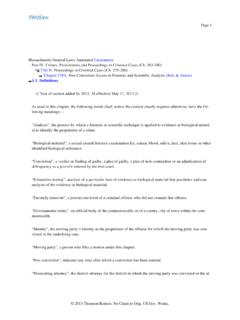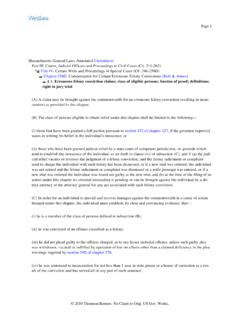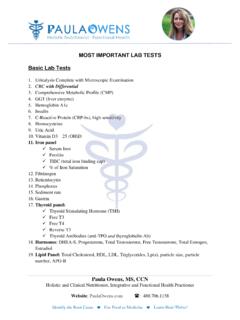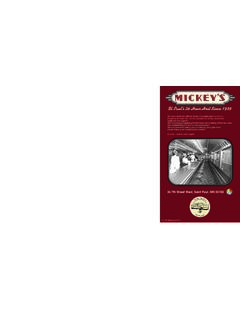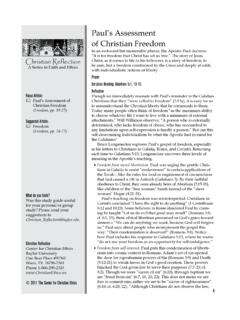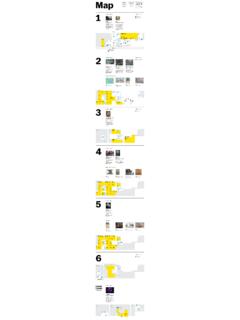Transcription of Claims of Ineffective Assistance of Counsel
1 Court Findings of Ineffective Assistance of Counsel Claims in Post Conviction Appeals Among the First 255 DNA Exoneration Cases Prepared by: Dr. Emily M. West Director of Research Innocence Project September 2010 1 Introduction The Sixth Amendment of the Constitution establishes the right to Assistance of Counsel for individuals accused of crimes, and the Supreme Court has established that states must provide representation for indigent defendants. Unfortunately, the lack of national standards for creating and funding such a system has left most states with inadequate, underfunded systems1. This problem has led to overburdened and sometimes incompetent defense lawyers and a lack of funding for the investigative process, all of which can contribute to inadequate defense, and in some cases, wrongful convictions.
2 Yet, the standard set in the landmark decision in Strickland v. Washington creates an extremely high burden on the defendant to establish ineffectiveness. In Strickland v. Washington, the Supreme Court set a two prong test to determine ineffectiveness the Counsel 's representation must fall below an objective standard of reasonableness, and there must be reasonable probability that, but for Counsel 's unprofessional errors, the result of the proceeding would have been different2. Further, in evaluating the performance of Counsel , the Supreme Court stated that courts must be highly court must indulge a strong presumption that Counsel s performance was within the wide range of reasonable professional Assistance . 3 Allowing such deference to the defense sets a low bar for defining effectiveness, making it difficult for defendants to gain post conviction relief via Claims of Ineffective Assistance of Counsel .
3 Review studies of post conviction appeals have demonstrated that Ineffective Assistance of Counsel is the most commonly raised issue. One study by NCSC, reviewing Habeas Corpus Claims , found that while nearly half of state Claims involved allegations of Ineffective Assistance of Counsel , only eight percent found relief4. DNA exoneration cases offer a unique perspective on this issue, given that we know the clients in these cases were convicted of crimes they did not commit. However, as this review will demonstrate DNA exonerees do not seem more likely to find relief on this claim than those in the larger prison population. A review of published appeals among the DNA exonerations reveals that 54 exonerees (about 1 in 5) raised Claims of Ineffective Assistance of Counsel and courts rejected these Claims in the overwhelming majority of cases5.
4 Methodology In order to locate appeals involving Ineffective Assistance of Counsel , WestLaw was accessed to conduct searches using specific search terms, as well as more general searches by exoneree name and state of conviction. This summary relies on published appellate decisions and therefore does not 1 The Constitution Project (2009). Justice Denied: America s Continuing Neglect of Our Constitutional Right to Counsel . 2 Strickland V. Washington, 466 668 (1984). 3 Id. 4 Brandon Garrett, Judging Innocence, 108 Columbia Law Review, 107 (2008); Victor E. Flango, Habeas Corpus in State and Federal Courts (1994) at #search=%22habeas%20tudy%22 ( NCSC study ). 5 Six others raised IAC Claims , but court findings were not available (they did not respond or address the claim) and were therefore excluded from this analysis.
5 2 capture the full scope of all appeals that exonerees may have filed involving Ineffective Assistance of Counsel . Court Findings in Appeals Involving Ineffective Assistance of Counsel Claims A review of published appeals revealed that 54 of the first 255 DNA exonerees (21%) raised Claims of Ineffective Assistance of Counsel . In the overwhelming majority of these appeals, the courts rejected the Claims (81%), however in seven cases, courts agreed with appellants and found Ineffective Assistance of Counsel , leading to reversals of convictions for six exonerees and new representation in one case (additional details of these seven cases are presented in the last section of this summary). In three other cases courts either determined that the actions, or lack thereof, of the Counsel were harmless ( Counsel deficient, but no prejudice) or courts remanded the case to lower courts for further review.
6 3 81%13%6%0%10%20%30%40%50%60%70%80%90%100 %Rejected (n=44)Harmful (n=7)Harmless/Remanded (n=3)Court Findings of Ineffective Assistance of Counsel Claims in DNA Exoneration Cases N=54 Types of Claims Pursued While there was great variation in the specific types of Claims pursued in these appeals, a few trends emerge. As presented in the figure below, the most common types of Claims included defense lawyers who: failed to present defense witnesses (often to establish/confirm an alibi); failed to seek DNA testing or have serology testing done to try to exclude the client; failed to object to prosecutor arguments or to evidence introduced by the state; and failed to interview witnesses in preparation for trial or to cross examine state witnesses.
7 Other examples of less frequently reported Claims included failure to investigate, failure to object to an ID, and failure to present expert testimony. Half of exonerees who presented Ineffective Assistance of Counsel Claims in appeals raised multiple Claims . Since most of these cases were rejected on appeal, it is difficult to determine whether some Claims are more likely than others to find relief in the courts. Among the seven appeals where courts confirmed Ineffective Assistance of Counsel , the types of Claims varied widely (conflict of interest issue; failure to seek expert; failure to seek DNA testing; failure to investigate). When examining the appeals where courts rejected the Claims , here again no distinct patterns emerged, however, it did appear that simple negligence without awareness in pursuit of a reasonable strategy did not meet the court s definition of Ineffective Assistance of Counsel .
8 If the record was silent on strategy, the courts tended to give defense Counsel the benefit of doubt. 11101010927051015202530 Failure to present defense witnessesFailure to seek DNA or serology testingFailure to object to pros. argument/statementsFailure to object to evidence/suppress evidenceFailure to interview/cross witnessesMultiple claimsExamples of Types of Ineffective Assistance of Counsel ClaimsN=54 4 5 Details of the 7 Appeals Where Courts Confirmed Allegations of Ineffective Assistance of Counsel : Jimmy Bromgard, MT Bromgard s court appointed lawyer failed to file an appeal after his conviction. o Court s reasoning: Appellate court agreed that defense Counsel was inadequate by not filing appeals. In 1991 Bromgard was granted a new lawyer (cited in State v.)
9 Bromgard, 261 Mont. 291). His new lawyer filed subsequent appeals but Bromgard did not find relief until DNA testing later exonerated him. Anthony Hicks, WI Anthony Hicks private lawyer decided not to do a DNA test, which he never discussed with the client. Counsel Claims he did not because 1. Strategy none of the serology evidence could be conclusively linked to the defendant. 2. He thought that the hair evidence would be inadmissible. 3. He said the cost of DNA testing was an issue. [NOTE: DNA testing had already been performed when this appeal was heard. However, the prosecutor refused to drop charges, suggesting that since only one of the pubic hairs excluded him, the others could have been his (these other hairs were not suitable for DNA testing).]
10 ] o Court s reasoning: The court did not agree with the defense Counsel s reasoning strategy argument was not convincing (testing DNA would have complimented the strategy he did follow) (State v. Hicks, 536 487). NOTE: see Josiah Sutton s case below this similar claim was rejected by another court, revealing the broad variation in the way different courts interpret and apply the test for Ineffective Assistance of Counsel . Hicks trial Counsel understood that the hair samples were going to be a major issue in the case. But he has provided no reasoned basis for failing to pursue a testing process that he knew had the potential to provide exculpatory evidence on this major issue. We do not intend to suggest that failure to obtain DNA test results is always deficient circumstances of each case.
